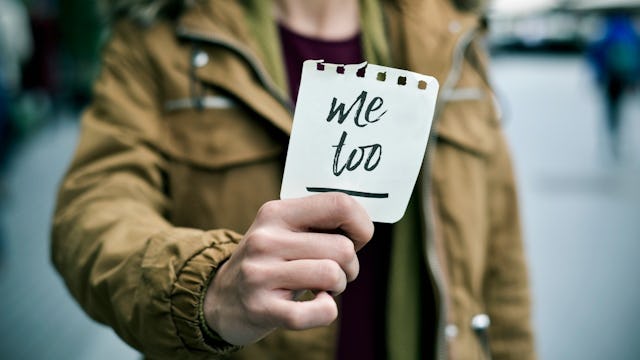5 Ugly Truths About The #MeToo Movement

It has been both encouraging and disenchanting to witness the power of the #MeToo campaign. Women united to shed light on a problem that many had been ignoring for years. While this conversation has gained momentum and made plenty of waves in social media and public events, it still has a long way to go before making a real impact on our society as a whole.
So far, the #MeToo movement has made it more acceptable for women to speak up and say something, but since many of the victims didn’t feel it was okay to speak up until now (and many women still don’t feel comfortable speaking up), the problem existed long before Weinstein.
There are some hard truths and harsh facts that we still have to confront for this movement to transform our broken society.
1. Women with low income are still not able to speak up.
They have less access to lawyers and more at stake if they are single mothers and their harasser is in the workplace. For them, the choice is actually between feeding their kids or standing up for themselves. In some instances, even if they are brave enough to do something, they are shut down or blacklisted so it’s impossible to continue to work or to find other hourly positions.
2. Women are sometimes involved in silencing celebrities and other victims.
Political leaders pay off accusers. Supervisors ask their employees to not sue. Nurses and doctors belittle female patients that express concerns about an exam or procedure. Mothers punish daughters for speaking their minds. Be a lady, not an assertive “bitch” and everyone will love you.
3. Some reasons women didn’t come forward involved money, self-esteem, and career.
We should pay attention to what values we are raising little girls with if grown women believe their bodies are not as important as their careers. Girls waited until they had become icons in their field, rooted in their success, before stepping forward, instead of yelling as loudly as possible from the start or leaving their profession altogether.
4. The justice system isn’t always on our side.
Even if women were to speak up about their experiences and try to seek legal justice, many would not be able to go beyond pressing charges because they face an uphill battle in the legal system. Why embarrass yourself in court by sharing the intimate details of how you were violated if they are going to tell you that it was your fault for not trying harder to push someone off you? We need more victim reporting centers like these in Australia so women aren’t fearful of reporting the crimes and pursuing justice.
5. What about wives?
Some states actually permit marital rape by writing their laws so that if a spouse is ever accused, they can say that by definition they did not commit rape. Rape by a spouse is considered an exception in some states, unless force or violence was involved or the victim was drugged or medicated. And even if martial rape is considered a crime, penalties may be weak. For instance, in Virginia, the husband may be sentenced to therapy, but the wife’s opinion is considered. Let’s be clear: A woman doesn’t owe a man unconditional sex whenever he desires, against her will, despite the exchange of wedding vows between a couple.
When we, as a country, can admit that we have much more work to do than just listening to women or punishing those that they accuse, perhaps then we can unveil the darkness that started all of this –people’s emphasis on the wrong values and twisted opinions about what human rights mean.
We can raise future generations to want to value humans, instead of skimming by in life by respecting laws that they wouldn’t care about had they not been written by Congress, and let’s face it…these laws aren’t even enough anymore. Or we can sit back and hide behind our hashtags and blindness and become numb to it all, until one day every girl assumes that her body is not hers and that she must submit to whatever is asked, or forced, of her, in order to be considered a polite woman. Because all that matters is how we are viewed by others, right?